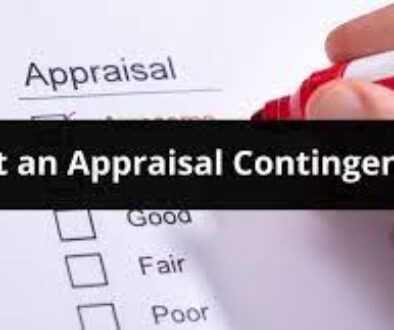Mortgage Contingency
Most real estate transactions come down to a buyer being able to acquire a mortgage. If a potential buyer signs a contract for a new home and then discovers they can’t secure financing, that’s when a mortgage contingency can come into play. A mortgage contingency – also known as a financing contingency or a loan contingency – is a clause that allows buyers to cancel the contract of the home purchase without penalty and receive a refund of their earnest money deposit if they’re unable to secure a mortgage.
Let’s take a closer look at how adding a mortgage contingency clause to a home sale agreement can benefit both home buyers and sellers.
What Is A Mortgage Contingency (Or Loan Contingency)?
A mortgage contingency is a clause in real estate transactions that gives home buyers a timeframe to secure a mortgage loan for a home. If the loan can’t be secured, the buyer can walk away without legal repercussions and have their earnest money deposit returned.
The loan contingency period is typically contracted to last 30 – 60 days and must be agreed on by the buyer and seller in a purchase contract. The buyer is usually expected to secure financing and gain approval for a mortgage before closing on the house can begin.
Other Types Of Real Estate Contingencies
Several types of contingencies built into real estate contracts to protect home buyers and sellers from unexpected changes during the sales process. Some common examples include:
- Home inspection contingencies – The buyer requests an inspection of the property before agreeing to purchase.
- Appraisal contingencies – If a property appraises for less than the purchase price, the buyer can legally back out of the sale. If they stay the course and the seller won’t reduce the asking price to match the appraised value, a lender will request a higher down payment.
- Title contingencies: If a buyer wants a clear title on the property, they can request a title search to look for any liens or easements.
- Home sale contingencies: A buyer can back out of a sale if they’re unable to sell their current home first.
How Does A Mortgage Contingency Work?
When a buyer is ready to buy a property, the first step is to submit a purchase offer to the seller. If they haven’t been preapproved for a mortgage or aren’t sure whether they’ll qualify for the appropriate loan, they can add a mortgage contingency to the offer. Once both parties sign the purchase agreement, the buyer will submit an earnest money deposit and the seller will take the property off the market.
At that point, the buyer has the length of the mortgage contingency period to obtain financing from a lender. Once approved for the mortgage, they provide the seller with a mortgage commitment letter from their lender, and the next steps of the home closing process are set into motion.
If the buyer doesn’t qualify for the loan or fails to secure financing in time, they can terminate the contract. With a mortgage contingency clause, either party can back out of the home sale agreement during the contingency period with no penalties. The seller will be free to pursue other offers, and the buyer will receive their earnest money deposit back.
What Goes Into A Mortgage Contingency Clause?
The home buyer and seller must agree upon the conditions outlined in the mortgage contingency. It should include details about the lending terms described below.
Mortgage Contingency Deadline
As mentioned, the mortgage contingency period mandates how long the buyer has to secure the appropriate loan, and the deadline is typically set for between 30 – 60 days. Both parties must agree to the timeframe.
In some situations, buyers and sellers may opt to add a mortgage contingency extension date in the purchase agreement. This lending term includes provisions for stretching the mortgage contingency period if the buyer is unable to obtain the appropriate loan before the deadline. However, the seller isn’t obligated to grant a contingency extension, and they can walk away from the sale if the contingency expires.
Type Of Mortgages
Most mortgage contingency clauses specify the type of mortgage the buyer needs to secure. After reviewing loan options, both parties must settle on the specific mortgage loan the buyer will need to move forward in the closing process.
Amount Of Money Needed
One of the most important terms of the mortgage contingency clause is the exact loan amount the buyer must be approved for. This condition acts as a secondary protection for the buyer. If they’re approved for a mortgage but not the amount listed in the contract, they can cancel the sale without consequences.
Maximum Interest Rate
Buyers should let sellers know what interest rate they’re comfortable paying monthly. This way, if their home loan is approved with a higher rate than they wanted, the mortgage contingency can allow them to back out of the sale.
Closing Or Origination Fees
Before signing the purchase agreement, it’s important to establish the closing costs and fees that the buyer will be obligated to pay to secure the loan. Among other fees, the mortgage lender typically charges origination fees, which include the cost of processing, underwriting and funding the loan. It’s helpful for the buyer to factor these additional fees into their home-buying budget.
Should You Waive A Mortgage Contingency Clause?
Although the mortgage contingency clause is included in most real estate agreements, some buyers can and may choose to waive it depending on their circumstances. Buyers may consider this option if they’re paying for the property in cash or they’ve been preapproved for the necessary loan. In a competitive market,a seller who is weighing multiple offers may ask buyers to waive the mortgage contingency in order to close the sale quickly.
Forgoing the mortgage contingency clause can be risky. If the buyer’s mortgage application falls through after they’ve waived the protective clause, the buyer will lose their earnest money deposit and be vulnerable to additional fees and potential lawsuits.




